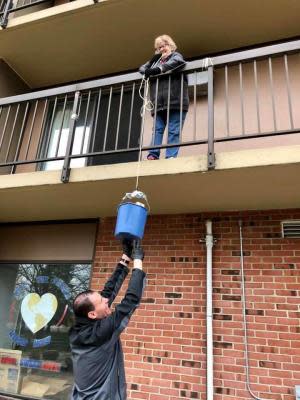MCOP still a force in aiding families, seniors


The Monroe County Opportunity Program is still actively working to offset the negative effects of COVID-19 on low-income individuals, families and senior citizens in the county.
“Community action is alive and well across the United States, but especially here,” Stephanie Zorn-Kasprzak, executive director of MCOP, told county commissioners during her annual report last week. “Your community action agency didn’t stop our services during the pandemic. We just rolled up our sleeves to respond to the (most pressing) community needs and met them head on.”
MCOP’s many programs and services met the needs of an estimated 15,000 people in 2021, which represents about 10 percent of the county’s population, Kasprzak said.
“That’s a wonderful penetration rate,” she noted. “Our actual poverty rate is a little higher than that. We aim to take care of people.”
The majority of its programs meet community needs, but there is an emphasis on the following programs that received a boost in funding from federal and state resources, she said. These include, but are not limited to:
Food Assistance Programs and Monroe County Food Bank – MCOP, located at 1140 S. Telegraph Rd., and the Opportunity Center that the agency operates in partnership with the city at 120 Eastchester St., continued to provide food to hungry families through its Lord’s Harvest Pantry, a network of food partners, mobile food distributions and the USDA commodity programs. During 2020, a total of 2.4 million pounds of food was distributed across the county.
“We don’t see that waning in 2022,” Kasprzak said. “We’re the food hub for Monroe County. We have hundreds of community partners doing this work.”
To receive food assistance, persons can call MCOP at 241-2775 for an appointment or a schedule of the mobile food distributions.
Weatherization Assistance – The program aims to reduce the energy burdens on low-income families at 200 percent of the federal poverty level and through the installation and replacement of doors and windows and other energy saving measures. Local contractors are used to provide the interventions to eligible households. To fill out an application, call MCOP at Ext. 803.
MCOP is getting a federal grant to boost services for weatherization efforts.’
“We’ll need as many applicants as possible,” the director said.
COVID Emergency Rental Assistance Funds – This vital eviction-diversion program assists with keeping people who are struggling with the pandemic in their homes and avoiding homelessness. In addition to providing rental assistance, households can be helped with their utilities and Internet costs as well, Kasprzak said. Households that are at 80 percent of the area’s median income are eligible. To date, more than 1,900 households have been served.
To inquire about the program, call MCOP at Ext. 809 or visit the portal at www.michigan.gov/mshda/0,4641,7-141-5555-533463--,00.html.
Kasprzak is also chairman of the Monroe County Human Services Network that works to prevent homelessness in the county. The county received an initial federal grant of $1.1 million in 2020 to keep people in their homes. A second grant, this one for $7.6 million, was received this year to do the same and is being implemented today, she said. So far, more than 1,900 households have been saved from being evicted, she said.
“We expect another wave after Jan. 1, so we will continue that program into 2022,” she said. “Thanks to us, so many people didn’t lose their homes.”
Homeowner Education Program – Certified housing counselors at MCOP provide educational programs such as financial literacy, homeowner education and rental assistance through the education program. The effort also includes one-on-one housing counseling, debt reduction and foreclosure prevention services. Classes can be in person or via zoom. The Michigan Homeowners Assistance Fund starts in 2022 and will provide homeowners with hardships due to COVID-19 a series of interventions including delinquent mortgages, escrow shortages, land contract payments and property tax assistance. To schedule an appointment, email Anna Grassley at agrassley@monroecountyop.org.
New this year is a low-income water assistance program that started Dec. 1. The program provides direct payments for water and sewer utilities for clients at or below 150 percent of the federal poverty level. The maximum reimbursement is $650 per household. Interested persons should call for an appointment.
Kasprzak encouraged commissioners to visit the Opportunity Center, which MCOP operates in a partnership with the City of Monroe. The building had a recent makeover with a new commercial kitchen, food pantry area, weight room, gym floor and health hub installed. A total of 4,380 meals were directly delivered to senior citizens by staff at the center. The meals were delivered five days a week, so staff could check on them during the pandemic, she said.
Hours for the center are from 10 a.m. to 6 p.m. Monday through Thursday, from 10 a.m. to 3 p.m. Friday and from noon to 4 p.m. Saturday. The building is available for renting on Sundays or other days.
MCOP still accepts donations of fresh produce and vegetables and has staff available for pickups.
This article originally appeared on The Monroe News: MCOP still a force in aiding families, seniors
